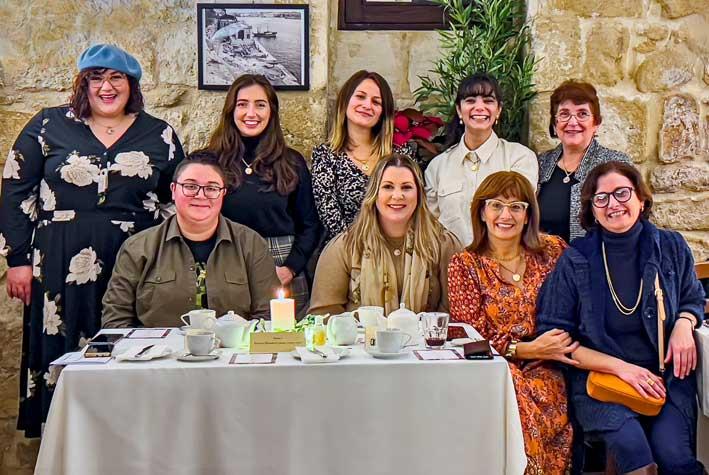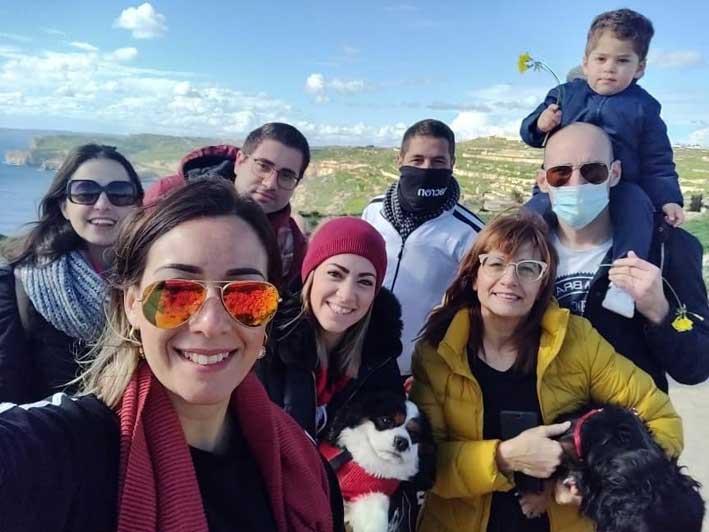"We are now two years into the Covid-19 pandemic, and uncertainties around its duration and longer-term impacts remain extremely high. A normal working day, a lunch with friends, a hug and a kiss exchanged with our loved ones, a holiday-break - all of these actions became conditional if not exceptional. Indeed, we have become the protagonists of what will be remembered as a milestone in human history.
Looking back, life in pandemic days was not so cruel to me (so far). Family time increased generously as my house became the venue for Sunday lunches, barbeque nights, and wine and platter evenings shared with my three children, their spouses, and my grandchildren (always restrictions permitting!). Games were re-discovered, as were long walks in the countryside with pit-stops for homemade cake and coffee. Yet, amidst all of these positive experiences there was one thing which I truly missed, and that was the flexibility to do research at the archives. For the seasoned researcher, a visit to an archive is an addiction, an exhilarating experience which, topped up with a new discovery, becomes the highlight of the day, if not the year.

First row from left (sitting): Gabriella Cassar Meli, Charlene Ellul, Joan Abela, Theresa Zammit Lupi. Second row from left: (standing): Christina Cassar Meli, Vanessa Buhagiar, Chanelle Briffa, Maria Borg, Isabelle Camilleri.
My first visit to the Notarial Archives at St Christopher Street, Valletta, was way back in 2002 when I was still an undergrad History student. Ever since that first day I set foot in that derelict eighteenth-century palazzo, with its dark shabby rooms filled with centuries-old historic manuscripts, I fell in love with the place. In more ways than one, I felt that its neglect had preserved its original beauty and character. The place was magical, all it needed was love and care, and I was ready to give it. Each visit took me on a journey through time; all I had to do was choose a volume. After several hours of research, the names of people living centuries ago became even more familiar than those of my neighbours. The more I read the more flesh I would put into these characters. Often my imagination would be ignited to such an extent that I would mentally develop a fictional portrait of my favourite ones.
Yet these visits were also a wakeup call for the need of the preservation of the archives. I felt it was my duty both as a historian and a citizen to raise awareness about their sorry state of preservation. The beginning was difficult and I often felt I was a lone voice calling in the wilderness. Each and every time there was a change of Minister or other public officials, I had to start my battle from scratch. Looking back, the task was daunting, and had it not been for a generous measure of perseverance and support from friends, I doubt I would have survived the ordeal. Often, sponsors would question why the private sector was being asked to contribute to save government property. And that is when the many historic characters I had discovered came to my rescue, just like in a fairytale. People would be in awe when hearing about Nuncius Chamire's will which preceded the discovery of America by sixty years or the illuminated manuscripts that were given a second life. Imagine this: six hundred years of history being projected before you, giving precious insights into the everyday life of our ancestors.

Joan with her children and grandchildren enjoying the countryside
I was lucky enough that throughout this journey I was accompanied by so many talented and professional people. They are too many to mention, but two in particular stand out, Francesca Balzan, an artist and art historian, and Theresa Zammit Lupi, a book and paper conservator. The setting up of the Notarial Archives Foundation made it possible to be better organized. Volunteers were recruited, potential sponsors invited on site, and professionals encouraged to join the team. Soon the once dark, silent rooms filled up with researchers, volunteers, and staff, turning them into a hub of activity. Notwithstanding the financial difficulties, we were determined to set high standards - if it's not the best it's not good for the archives. We also adopted a motto: Ad servandum posteritati - to save for posterity. A scheme aimed to entice people to sponsor the conservation treatment of the volumes was set up and called Adopt a Notary. This turned out to be very popular with sponsors, generating multiple projects which ensured the preservation of our nation's paper heritage.
The Notarial Archives at St Christopher Street soon became an important point of reference, both for conducting historic research and for those wanting to pursue a career in conservation. Our next goal was to make it a multi-disciplinary space, not only academically but also artistically. This vision soon materialized and transformed itself into numerous academic publications and artistic projects. A worthy mention is Alex Attard's 2018 exhibition Parallel Existences wherein the artist breathed new life into badly deformed manuscripts, giving them dignity through his artistic lens. The cherry on the cake was the accompanying award-winning publication which showcased the great academic and artistic potential of the archives.
The near future will see a newly rehabilitated Notarial Archives, thanks to a five-million European funded project. Although we have been deprived of the archives for more than three years, our motivation lingers. Our vision is to continue to work for the benefit of the collection, to collaborate with local and international institutions, and to keep high standards in research and conservation. Being surrounded by such a wonderful group of committed people, who were always protagonists and never spectators, I am sure that we will reach our expectations."